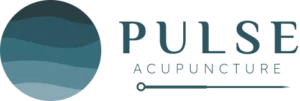Acupuncture for Headaches and Migraines
Acupuncture for Headaches and Migraines
Types and Causes of Common Headaches
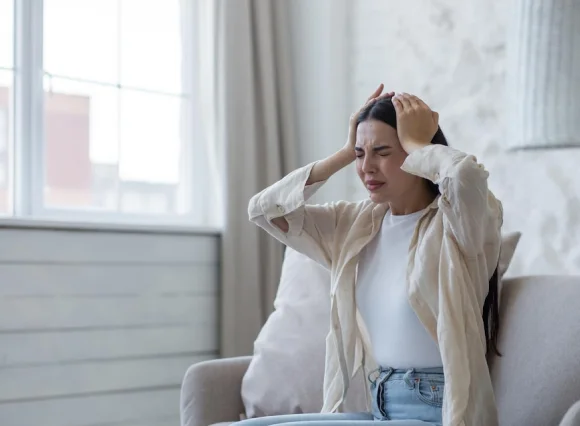
Migraine is a neurological condition characterized by recurrent moderate to severe headaches, often pulsating or throbbing in nature. These headaches tend to occur on one side of the head and can last for hours to days. Migraines are often accompanied by additional symptoms such as nausea, vomiting, sensitivity to light, and sometimes visual disturbances known as auras.
The exact cause of migraines isn’t fully understood, but genetics and abnormal brain activity are thought to play a role. Triggers can vary widely and include stress, hormonal changes, certain foods, and environmental factors. Migraines can significantly disrupt daily life, but management strategies like avoiding triggers, lifestyle changes, and medication can help alleviate their impact.
What is Migraine?
- Tension Headaches. These are the most prevalent type, often stemming from muscle tension in the neck and scalp due to stress or poor posture.
- Migraine Headaches. Known for intense throbbing pain, migraines might result from abnormal brain activity, genetic factors, and certain triggers like hormonal changes or specific foods.
- Cluster Headaches. Rare but excruciating, these occur in clusters over weeks or months and are linked to the brain’s hypothalamus.
- Sinus Headaches. Inflammation of the sinuses due to infections or allergies can cause pressure and pain in the forehead or cheeks.
- Rebound Headaches. Overusing pain medications can lead to rebound headaches, perpetuating a cycle of pain.
Migraine Causes
- Genetic Predisposition. Family history can increase susceptibility, suggesting a genetic component.
- Abnormal Brain Activity. Disruptions in brain signals and neurotransmitter imbalances might trigger migraines.
- Hormonal Changes. Fluctuations in estrogen levels, particularly in women, can lead to migraines, often linked to menstrual cycles.
- Triggers. Certain foods (like aged cheeses or processed meats), lack of sleep, stress, bright lights, strong odors, and weather changes can initiate attacks.
- Environmental Factors. Exposure to strong stimuli, such as loud noises or flickering lights, can act as triggers.
- Medication and Overuse. Excessive use of pain-relief medications can paradoxically lead to more frequent migraines.
Acupuncture for Migraines & Headaches
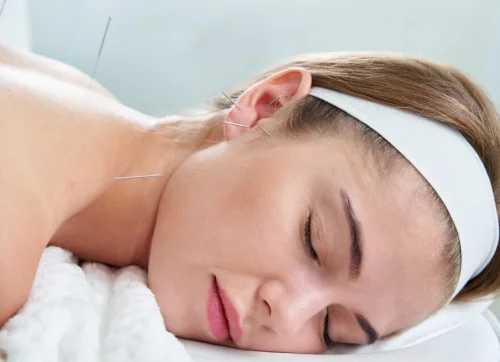
Acupuncture has gained attention as a complementary approach for managing migraines and headaches. This traditional Chinese practice involves inserting thin needles into specific points on the body to stimulate energy flow. While individual experiences vary, some people find relief through acupuncture.
For headaches, acupuncturists target acupuncture points for headaches like the temples, the base of the skull, and between the eyebrows. Distal points on the wrists, ankles and ears strengthen the treatment. These points are believed to help release tension and improve blood circulation, potentially alleviating headache discomfort.
Migraine sufferers might find acupuncture beneficial, too. Practitioners may focus on acupuncture points for migraines associated with the head, neck, and wrists. The intent is to potentially reduce the frequency and severity of migraines, as well as manage accompanying symptoms like nausea or sensitivity to light.
It’s important to approach acupuncture for migraines and headaches as part of a holistic strategy, combining it with lifestyle adjustments and medical guidance to achieve maximum result. Acupuncture for migraines itself is a good solution to reduce muscle tension and activate natural body’s healing mechanisms.
Before trying acupuncture, consult a qualified practitioner and communicate your medical history, ensuring it’s a safe option for you. Acupuncture for headaches and migraines holds potential, but outcomes can vary, underscoring the need for a personalized approach to treatment.
Relieve Migraines and Headaches with Acupuncture at Pulse Acupuncture
Discover potential relief from migraines and tension headaches through acupuncture at Pulse Acupuncture Clinic, led by experienced practitioner Marina Doktorman. With a focus on personalized care, Marina targets acupuncture points that may help alleviate headache discomfort. While results can vary from person to person, acupuncture for tension headaches and acupuncture for weight loss have been sought-after complementary approaches. Marina’s expertise ensures a tailored experience that considers your unique needs. If you’re considering acupuncture for migraine or tension headache management, consulting with Marina Doktorman at Pulse Acupuncture could be a step toward finding a suitable solution.
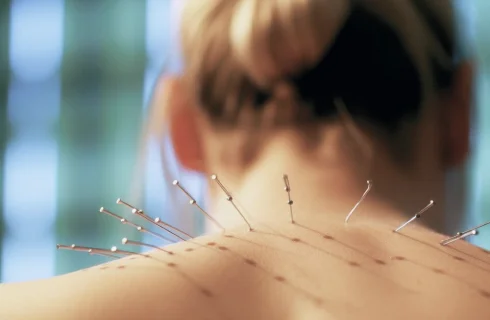
-

Marina Doktorman, M.S., L.Ac., is an experienced acupuncturist who obtained her Masters of Acupuncture from the Tri-State College of Acupuncture in New York City in 2001. During her studies, she focused on Chinese Herbology, a branch of Traditional Chinese Medicine (TCM) that utilizes herbs to complement acupuncture treatments. Marina is licensed in both New York (NY) and New Jersey (NJ) and holds a Diplomate of Acupuncture from the National Certification Commission for Acupuncture and Oriental Medicine (NCCAOM), indicating her expertise in the field.
Why Pulse Acupuncture?

Experience
Marina Doktorman, L.Ac. has over 20 years of clinical experience.

RELAXATION
At Pulse Acupuncture, we aim to cultivate a spa-like environment.

Comfort
All of our needles are of the highest quality for painless insertion.
Patient Reviews in Brooklyn
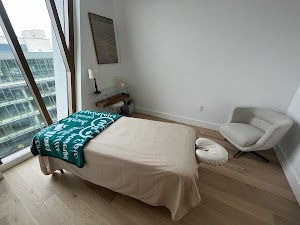
Acupuncture for Headaches and Migraines - FAQ
How does acupuncture help alleviate headaches and migraines?
Acupuncture may help in treating headaches and migraines by:
- Releasing Endorphins: These are natural painkillers produced by the body.
- Improving Blood Flow: Enhanced circulation can help reduce muscle tension and alleviate headache pain.
- Regulating Neurotransmitters: Acupuncture might impact neurotransmitters like serotonin, which plays a role in migraines.
- Balancing Qi: In traditional Chinese medicine, imbalances in Qi (energy flow) can lead to ailments, including headaches. Acupuncture aims to restore this balance.
How many sessions are typically required to see relief?
The number of sessions will vary depending on the severity and type of headaches or migraines. Some people experience relief after just one session, while others might need multiple sessions over weeks or months for lasting benefits.
Can I combine acupuncture with my current headache or migraine medications?
Yes, many patients combine acupuncture with their prescribed medications. Always inform your acupuncturist and doctor about any medications you’re taking to ensure there are no contraindications.
Are there any side effects to acupuncture treatment for headaches and migraines?
Acupuncture is generally safe when performed by trained professionals. Some potential side effects include minor bruising, light bleeding, or soreness at the needle insertion sites.
Contact us
Acupuncture therapy at Pulse Acupuncture Practice, at Clifton, NJ and Williamsburg, Brooklyn, NYC offers unique combination of various cupuncture types for healing on all levels: emotional, spiritual and physical by integrating ancient wisdom of energy healing with modern acupuncture techniques.

